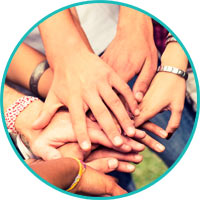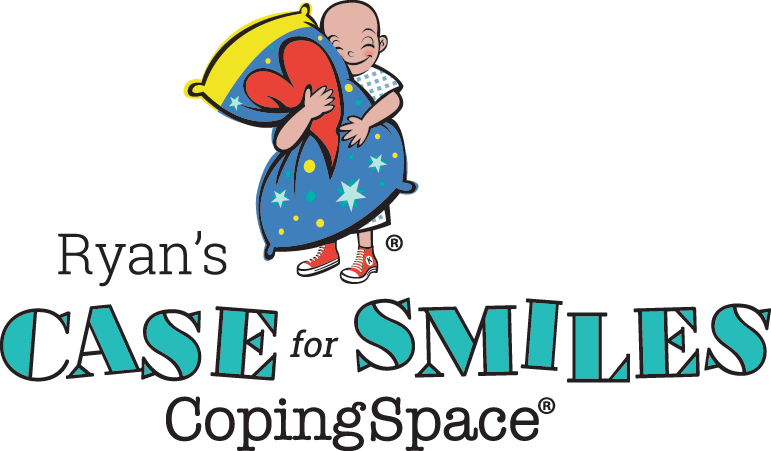COMMUNITY
Children and families facing serious illness need a strong support team for the long haul. Friends, extended family, neighbors, co-workers, classmates, and other community members, who find ways to be helpful as the family’s needs evolve, are a crucial part of that team.
Children and families facing serious illness need a strong support team for the long haul. Friends, extended family, neighbors, co-workers, classmates, and other community members, who find ways to be helpful as the family’s needs evolve, are a crucial part of that team.
 When children are initially diagnosed with an illness, or have a sudden hospitalization, the community often comes together to try to help the family. This support network is an important part of the team. Unfortunately, this initial response may trail off after a little while. Checking in periodically, throughout the treatment journey, is one of the most crucial ways friends and family can help.
When children are initially diagnosed with an illness, or have a sudden hospitalization, the community often comes together to try to help the family. This support network is an important part of the team. Unfortunately, this initial response may trail off after a little while. Checking in periodically, throughout the treatment journey, is one of the most crucial ways friends and family can help.
Tips to Support a Family During Treatment
- Don’t assume what will be helpful. Ask and observe to see what the family needs now.
- Remember that needs may change over time.
- The best gift a friend/family member can give is TIME.
• Sit with their child in the hospital so the caregiver can take a break.
• Stop by for coffee, lunch, etc. and allow the caregiver to vent.
• If the family has other children, offer to take them on a play date.
• If a family has pets, offer to assist with them.
- Practical help is also greatly appreciated. Families may appreciate a home cooked meal, groceries, house cleaning or someone to help weed the garden.
- Appointments and hospitalizations make it hard to predict when families are home. Please remember to call or text before stopping by.
- If you are bringing a meal for a family, ask what they have been eating lately (“Not baked ziti again!”) and if there are any dietary restrictions.
- Remember the siblings – send them cards or notes to show that you are thinking of them.
- It is good to ask what is needed, but don’t expect caregivers to always know what to say when you ask, “What can I do?” Concrete suggestion, such as, “I’ll bring you breakfast Saturday” or “I’ll mow the grass”, can be helpful. For more ideas, check out our list of top 10 gifts to give a friend.
- Holidays, milestones and special occasions can be especially challenging. Treatment protocols and physical limitations can prevent celebrations, and it’s normal for every member of the family to grieve for the way things were. Be sure to check in before and during significant days and think of ways you can help bring a little holiday cheer. More ideas on how to help a friend during the holidays can be found here.
 When children are initially diagnosed with an illness, or have a sudden hospitalization, the community often comes together to try to help the family. This support network is an important part of the team. Unfortunately, this initial response may trail off after a little while. Checking in periodically, throughout the treatment journey, is one of the most crucial ways friends and family can help.
When children are initially diagnosed with an illness, or have a sudden hospitalization, the community often comes together to try to help the family. This support network is an important part of the team. Unfortunately, this initial response may trail off after a little while. Checking in periodically, throughout the treatment journey, is one of the most crucial ways friends and family can help.
Tips to Support a Family During Treatment
- Don’t assume what will be helpful. Ask and observe to see what the family needs now.
- Remember that needs may change over time.
- The best gift a friend/family member can give is TIME.
• Sit with their child in the hospital so the caregiver can take a break.
• Stop by for coffee, lunch, etc. and allow the caregiver to vent.
• If the family has other children, offer to take them on a play date.
• If a family has pets, offer to assist with them.
- Practical help is also greatly appreciated. Families may appreciate a home cooked meal, groceries, house cleaning or someone to help weed the garden.
- Appointments and hospitalizations make it hard to predict when families are home. Please remember to call or text before stopping by.
- If you are bringing a meal for a family, ask what they have been eating lately (“Not baked ziti again!”) and if there are any dietary restrictions.
- Remember the siblings – send them cards or notes to show that you are thinking of them.
- It is good to ask what is needed, but don’t expect caregivers to always know what to say when you ask, “What can I do?” Concrete suggestion, such as, “I’ll bring you breakfast Saturday” or “I’ll mow the grass”, can be helpful. For more ideas, check out our list of top 10 gifts to give a friend.
- Holidays, milestones and special occasions can be especially challenging. Treatment protocols and physical limitations can prevent celebrations, and it’s normal for every member of the family to grieve for the way things were. Be sure to check in before and during significant days and think of ways you can help bring a little holiday cheer. More ideas on how to help a friend during the holidays can be found here.
Helping While a Child Is at the Hospital
- Think about the siblings and parents when bringing gifts to the hospital. They are often overlooked but equally important.
- Pack parents or other caregivers a survival kit if they have to stay overnight. Think about things to keep them busy or fun snacks. Examples include nail polish, slippers, magazines etc.
- Children may appreciate toys or activities, but be sure to first check with the parent to see what is allowed.
- Gift cards to the grocery store or restaurants are always appreciated. Tip: Think of restaurants that are close to the hospital so families can order food without having to leave for long.
-
“My family appreciated when people brought fruit, homemade cookies, a craft project or a gift card when my child was in the hospital.” – A Grateful Mom
Understanding the Emotional Impact on Families
- Understand that your friend is forever changed. Be there for them.
- Your friend may be short-fused or impatient. It is because they are overwhelmed and scared. Don’t let that push you away.
Some Things to Avoid:
- Please refrain from sending articles on holistic medical cures found on Facebook or question treatment decisions.
- Try to refrain from saying phrases like:
• “Everything happens for a reason.”
• “I don’t know how you do it./You’re so brave.”
• “God only gives you what you can handle./All part of God’s plan.”
• “Don’t worry. He/She will be fine.”
- Don’t assume you know how they feel. Everyone’s experience is unique..
- While it’s tempting to be positive, try to avoid offering “stories of hope”, such as, “My friend was given a year to live and is now fully recovered.” While well intended, every illness/injury is different and it isn’t always helpful to compare.
How Do I Talk with the Child or Family?
- Invite the child, parents, and siblings to tell you how things are going. Understand if they don’t want to talk. If they do share, just listen.
- Some people don’t know what to say and so they do not reach out at all. If this is the case, tell them you don’t know what to say but are ready to listen and help.
- Send the caregiver a text or note to show them you are there, should they want to talk.
- When talking with the caregiver, be sure to talk about things other than their child’s illness or injury.
- Check in repeatedly and over time. Often there is a surge of support at diagnosis but then people move on and families feel forgotten. Illnesses and treatments can often go on for long periods of time and it’s helpful for families to have continual support.
- Find phrases to say, and not, by reading “What to Say to a Friend Whose Child Has Cancer or Another Serious Illness“.
